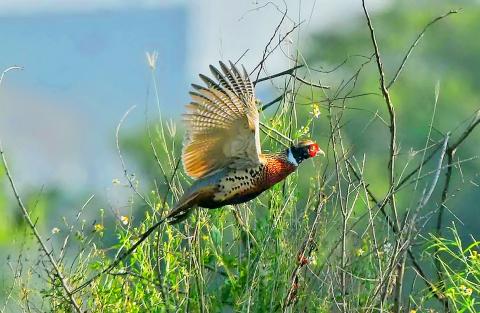More than 20 members of a native subspecies of ring-necked pheasant, commonly known as the “wailing chicken,” have been spotted by birdwatcher Huang San-ming within the Jinsha Borough of Tainan’s Sigang District. There have also been separate sightings of Formosan ring-necked pheasants perching in Beipu Borough in Jiangjun District and in Fandian Borough in the city’s Yanshuei District.
The Formosan ring-necked pheasant, Taiwan blue pheasant and mikado pheasant are the three main types of protected pheasant in Taiwan. The “wailing chicken,” or Formosan ring-necked pheasant, mostly perches in flat open fields and used to be a common sight in Taiwan. However, a combination of excessive hunting and overdevelopment has meant that these days it is rare to catch a glimpse of the bird. Huang says that Formosan ring-necked pheasants will immediately take off if they catch sight of a human or hear the wind rustling through the grass, which makes watching them extremely difficult.
(LIBERTY TIMES, TRANSLATED BY EDWARD JONES)

Photo courtesy of Huang San-ming
照片:黃三明提供
台灣特有亞種環頸雉(俗稱啼雞)在台南市西港區金砂里被鳥友黃三明發現有廿多隻出現。此外,將軍區北埔里、鹽水區飯店里也有台灣環頸雉棲息。
台灣環頸雉、藍腹鷳,和帝雉是台灣三大保育類雉雞。其中俗稱啼雞的環頸雉主要棲息在平地田野,早年常見,因濫捕加上過度開發,現在很少看到牠們蹤跡。黃三明說,因為啼雞一見人或風吹草動就跑,要看到牠們的身影不容易。
(自由時報楊金城)

A: Harvard professor Robert Waldinger’s “7-day Happiness Challenge” includes: Day 1: Take stock of your relationships; Day 2: The secret power of an 8-minute phone call; Day 3: Small talk with strangers has big benefits. B: That’s not too hard. What’s next? A: Day 4: Why you should write a “living eulogy;” Day 5: The importance of making work friends; Day 6: Don’t cancel those social plans. B: Good ideas. What’s the final challenge? A: Day 7: Keep happiness going all year long. So, I’m inviting some friends to the Taipei Lantern Festival today to build good relationships. Wanna

★ 本文由生成式 AI 協作,本刊編輯編修。 For tourists looking for a scenic way to spend an afternoon in Kaohsiung, heading to the British Consular Residence of Takao is the perfect choice. Its elevated position allows one to take in the bustling Kaohsiung Harbor to the east and the dazzling sunset over Sizihwan Bay to the west. This elegant red-brick building also serves as a portal to the city’s rich history. Interestingly, for 70 years, many people mistakenly identified this residence as the actual consulate. The history of “Takao,” the former name of Kaohsiung, began its international chapter in the mid-19th century. As European powers

★ 本文由生成式 AI 協作,本刊編輯編修。 Continued from yesterday(延續自昨日) https://www.taipeitimes.com/News/lang Kaohsiung’s deep connection with the sea continues to thrive, with Kaohsiung Harbor remaining a crucial hub for global shipping. In addition to the port, the city has emerged as a major player in another world-class maritime industry—yacht manufacturing, responsible for producing 80 percent of all Taiwan-made yachts. The yacht industry in Taiwan originated in the post-World War II era, when the US military presence in Taiwan provided local boat builders with guidance on making wooden yachts. The resulting craftsmanship was so exquisite that orders soon poured in. In 1977, Taiwan replaced Canada as the main yacht

★ Bilingual Story is a fictionalized account. 雙語故事部分內容純屬虛構。 The fog came before the knock. It covered the street and pressed against the window. Chao Gung-dao lit a small oil lamp, but his makeshift hut stayed dim. Another knock. Chao opened the door. The inspector stepped inside and removed his hat. He did not smile. “You remember me?” the inspector said. Chao resented the question. The inspector looked around the small room. His eyes stopped on a wooden box resting on a low beam above Chao’s head. “What is that?” Chao stayed silent. The inspector pulled the box down and